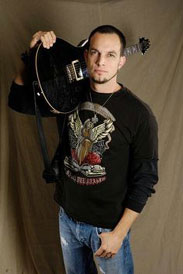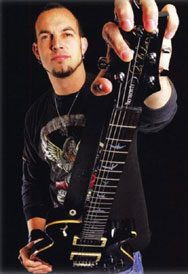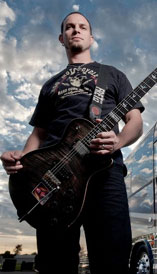|
Interview conducted April 16 2015 Interview published May 23 2015 |
The lead guitarist of Creed and Alter Bridge, Mark Tremonti, releases his second solo effort, Cauterize, on June 8th. This album is a little different to what we get to hear with the aforementioned bands, as it definitely contains a few songs that come out heavy and more direct. Another album, Dust, was recorded simultaneously and its release date is yet to be announced.
![]()
Tobbe: What you made call the album Cauterize?
Mark: You know, I first wanted to call it Providence and I was the only one who liked the name and I was like "Forget it! It's my solo album. We're gonna put it out as Providence.", but the more and more, people said "Uh, I'm not sure about that title…". I changed it and I went through and made about a hundred different ideas from lyrics and songtitles. All the one-word titles ended up being the best, and Cauterize was the word that stuck out the most.
Tobbe: Yes, it's a direct word.
Mark: Yes, it's a different word you don't see every day.
Tobbe: It's really hard to put a label on this album, because it contains a lot of different types of music. All within the heavier aspect though.
Mark: Yeah, you know, as a songwriter I love melodies first and foremost and I love speed metal, so I try to do my best to combine those worlds and at the same time I like really dark, moody stuff, but I also like stuff that makes you feel good, you know. So I wanna mix all that up and have all that within one album, or two albums in this case.
 Tobbe:
Yes, we'll get back to Dust later. If we compare Cauterize to your first
solo effort [All I Was], I think this new one is definitely more attacking
and maybe a little thrashier too. So where did you get the inspiration,
besides being into speed metal, to do the thrashier moves or riffs?
Tobbe:
Yes, we'll get back to Dust later. If we compare Cauterize to your first
solo effort [All I Was], I think this new one is definitely more attacking
and maybe a little thrashier too. So where did you get the inspiration,
besides being into speed metal, to do the thrashier moves or riffs?
Mark: I think when we did the first record, we were kind of in unknown territory, you know, and then as we were playing these songs live, it was always those heavy songs, like Brains and Wish You Well, that made the crowd go nuts and made us happy. So when we got back together, it was "Let's raise some heavy stuff that's gonna be fun to perform.". I would go through my laptop and show the guys ideas and one would be a mid-tempo riff "Okay. It's cool." and one would be a [Imitates a drilling machine.] and "Yes!". We wrote 8 really heavy songs right off the bat and that's when I was kind of like "You know what? We can't have it all be heavy.". It's gotta be dynamic, you know. I don't wanna just show one side of the songwriting. I wanna show all sides. It leaned mostly heavy, but it wouldn't be as heavy if it was all heavy. You know, if you didn't combine it with some more mellow songs.
Tobbe: What you do in Tremonti is rather different to what you do in Alter Bridge, so do you think it's important to separate your solo stuff from your main band?
Mark: Yeah, you know. I think there's a bigger gray area between these bands than there was between my first two bands. We were really trying to run away from our first band with Alter Bridge and make it as different as possible. With this band; Alter Bridge is getting heavier and heavier and heavier and heavier, and this band started out heavier, so it's kind of this gray area that's approaching. I think the big thing that helps is the fact that me and Myles [Kennedy] have very different voices and the rhythm section is completely different, you know. Alter Bridge is a very groovy pocket and this band is a very [Imitates a drilling machine again.] tight pocket, so it helps it to sound different. If I ever put out a [Imitates a drilling machine for the third time.] in Alter Bridge, nobody would go for it, you know.
Tobbe: So who does this album address to? Because it's quite different than Alter Bridge, and Creed, if we move back a little bit in time. Maybe those fans won't like this heavier approach?
Mark: They all seem to dig it so far, you know. I never think "Is this person gonna like it? Is that person gonna like it?". This is me and hopefully people will see now, when you listen to an Alter Bridge record, where the influences are coming from. The heavier stuff is where I come from, you know. When you're in a band, you kind of conform to what everybody likes and in this band I go for that metal stuff. Not to say; I love working with bands. I love the diversity that comes when you have all these different influences, but I was dead set on that this is something I want everybody to play on 10, you know. Garrett [Whitlock] thanked us in the first record, because like usually, producers will make me simplify my drums, and I said "No. Go crazy on the drums! Make 'em nuts!", you know.
Tobbe: So who has the final word? You or the producer? [Michael "Elvis" Baskette]
Mark: We do, you know. The producer is one of us. It's whatever's best for this song.
Tobbe: So what did he actually bring to the recordings this time?
Mark: He turns into a 5th member of the band, you know. In the first stages, we play him 24 songs that we'd put together. He makes his notes, and he doesn't let us see 'em. Then we'll go in the studio and we all kind of whittle it down to what we wanna do, so we're like "Which 4 songs are we gonna lose?" and we play 'em through again and there's sometimes we don't agree, like Arm Yourself was his least favorite song; Arm Yourself is one of our favorite songs. And in the end, as we're recording, he's like "This is a real fun one." and I'm like "Mike. See!". First impressions aren't always, you know, right.
Once we got into the studio, we'd take each song, play it. "Let's hear this transition again; what do you guys do? Let's do a stab here. Let's do a pause here. Let's maybe extend this part.". We'd all sit there and say "Hey, let's figure out the best way to organize the songs.", 'cause when we where putting 24 songs together, we did it relatively quick and then we really focus on it in pre-production. We'll do a song or two a day in pre-production, to get it ready and tempo map it. Sometimes the first verses gotta be a few beats faster than the chorus or vice versa.
There is a few songs that really happened in pre-production. Most of it was written before, but Providence. In the last day of pre-production, Elvis said "You've got everything you'd ever want on a record with these songs. The only thing you're missing is an epic song. You need this band's Blackbird [Alter Bridge song.]. You need something that is the staple of this record.". I said "So on the last day of pre-production you want me to pull out a song that's equal to the best song I think I ever had anything to do with?" and he's like "Yeah.". So I went through all my ideas that I had started. He's like "You know, there's a few riffs I heard you play earlier that I really like.". I pulled 'em back out and played it when he's like "That's the one!", so it's the finger picked pattern which happens to be a 6/8 pattern just like Blackbird.
He's good at inspiring you to write, 'cause he's like "You're very good at writing these epic choruses. Come on! Go! You can do it!". So I'm playing and playing and playing and it [Snaps his fingers.] just happened within 10 minutes, you know. The chorus happened and then we kind of break for dinner and we came back, like "All right. We've got the meat and potatoes to the song and now we need this bridge to be something special.". We wanted to add some progressive elements to this album. You know, some polyrhythms and stuff that makes you "Where the 1 in the beat?".
Elvis had the suggestion that "Let's try a 5/4 timing riff." and Wolfgang [Van Halen, bass] starts strumming on his bass and "You mean like this?" and he starts playing just a single note and then we all start playing around to it. Then I started doing a chord progression under it. Wolfie started doing a chord progression that kind of morphed. You know, I'm in the C and he's in the G, it's kind of a cool mix, and then I started singing over it and we all kind of looked at each other and "Done!" So that all came together pretty much in a day. All the lyrics, as the parts are going on, I'm writing them down. At every day in pre-production, I go sing the songs, so we can have the demos and I purposely write lyrics really fast so I can have good demos to listen to. And 80 percent stuck on the record. And then Flying Monkeys. It's my favorite song on the record…
Tobbe: All right. [Mumbles] Not my favorite.
Mark: What's that?
Tobbe: It’s not my favorite.
Mark: No? [Laughs] The transition, that chord change in the chorus, is really what made it for me and that happened in pre-production too.
Tobbe: I like Arm Yourself, Radical Change and Sympathy. That's my top 3, at this moment.
Mark: Nice.
Tobbe: I think I have listened to it 10 times, so in another 10 times, I might give you a different answer, I don't know.
Mark: Well, you see. You like Arm Yourself and Sympathy, which are 2 opposite songs and that's all I wanted this record to have; dynamics.
 Tobbe:
Yes. It's a very diverse record. So was there ever a question if you would
sing in this band or not?
Tobbe:
Yes. It's a very diverse record. So was there ever a question if you would
sing in this band or not?
Mark: No. I was always gonna sing in this band. Vocal melodies are my favorite thing to do. Guitar playing, I like a lot, but I love writing singing and writing vocal melodies. When I'm at home, listening to ideas, I'm always listening to the vocals. I listen to them over and over again. A riff, I'll hear, but "That's cool. Kick-ass riff.", but it doesn't lift me like a good song melody.
Tobbe: Yeah. The song melodies are important, even in metal, of course. It's only us nerds who listen to the music always. So do you think it's difficult to combine 2 bands, even if you have the time for it?
Mark: Not if your singer [Myles Kennedy] of the other band is doing the same thing. He'll go on tour and I'll go on tour. The writing load is harder. You have to work twice as hard with writing. But if we didn't have 2 bands, I think both of us would have way too many ideas that are getting wasted. That's why I did 2 records on this thing, because I went through my ideas over and over and over again and made sure that most of the things I wanted to get out were put out. There's still a ton of them sitting there.
Tobbe: Let's move to Dust a little bit. Is Dust a different record or is it similar to Cauterize?
Mark: Yeah. Dust is very similar to Cauterize. I looked at the 20 songs and like Sympathy and Unable To See. They're both kind of ballady songs, one's gonna be on one record and one will be on the other record. There's this song, there's that song. I tried to make both records balanced. The last thing I wanted to do is put out 12 or 13 songs and have people think that there's 7 b-sides. All the songs to me are equal. There's not songs that I like much less than the rest, like "Okay. That's a b-side.". The last thing I ever wanted was someone to buy Dust and say "No. It's not as good as the first record.". I want the people to go like "Oh, wow. It feels like the first record.".
Tobbe: But isn't it a little hazardous, because if people don't like the first record, they won't spend their money on the second?
Mark: Well, yeah, but if they don't like the first one, they won't buy it anyways.
Tobbe: What happens later, let's say in a couple of months, and you think that you're not really satisfied with what Dust has become. Is there a risk that you will have to go into the studio and re-record some stuff?
Mark: No. It's mastered.
Tobbe: Okay. It's mastered and done, so I guess it won't happen.
Mark: It's done, yeah. But for the people that don't like the first record, Dust is completely different.
Tobbe: [Laughs]
Mark: It's all ballads and sunshine.
Tobbe: Right. So what did your personnel, Garrett, Wolfgang and Eric [Friedman, guitar], actually bring to the table?
Mark: You know, they write their own parts. They do their own thing. They help arrange the songs. You know, they're all great musicians. Garrett's a killer drummer. Everybody's like "Man, that drummer is amazing.". Erock brings more of a bluesy style on the guitar side of things. Eric's my main source of bouncing ideas off. "You like this? You like this?". I trust his opinion. And then Wolfgang is just so good at what he does. There's been riffs that he'll be sitting on the couch playing and like "Oh, let's just dive into that riff. Let's try this.". He's a very smart musician.
 Tobbe:
What do you have left to prove? Isn't your success with the other 2 bands
well enough to still your hunger?
Tobbe:
What do you have left to prove? Isn't your success with the other 2 bands
well enough to still your hunger?
Mark: No, I've not proven anything. This is who I am. There's no thrill greater than taking something out of thin air and putting it into a song and see people's reaction to it, you know. My favorite part of the entire process is recording an album and being able to hear those songs before the world gets to hear 'em and then anticipate how people will like them. I write the songs, 'cause I love these songs. These are songs I'd wanna listen to and I enjoyed them when we finished them. Right now I'm like, I've heard them, you know, too much, but I know nobody has heard them yet, so I'm excited to see everybody's response.
Tobbe: You have traveled a lot in your career, so how do you combine the music with your family life, with kids and stuff?
Mark: For the whole last year I've been at home, you know. We recorded at home…
Tobbe: All right. I will take that question back.
Mark: You know, I wrote the record in Orlando [Florida], and recorded the record in Orlando. It's been done since December, so I've been at home until this trip. And then I'll go on tour for about 3 and a half weeks in the States. They'll come out and visit me. I'll come home for about a week and a half and then come over here for 3 weeks and then I'm home for another 3 months and then come back over here.
Tobbe: So what about the dates in the fall? Will you play in Sweden?
Mark: Oh, yeah. Absolutely.
Tobbe: And in Stockholm?
Mark: Yes.
Tobbe: Is that totally true, or?
Mark: Well, I mean, I'll definitely tell the agent it's gotta happen.
Tobbe: Do you think there's still a market for guys going solo? You know, if I compare you to like David Coverdale and Ronnie James Dio, who both came from big bands and became, maybe not as big, but…
Mark: I think when the songwriters are the solo artists, you know. Not when it's just like an instrumentalist. When it's somebody who's writing the songs, I think that that goes further because they're bringing something to the table. They're not just saying "Look at me!".
Tobbe: So how much time do you spend on songwriting?
Mark: Oh, tons.
Tobbe: And your vocals?
Mark: Vocals just happen when I'm practicing and I don't practice singing 'til before tour and on tour.
Tobbe: Do you warm up before you sing live?
Mark: I used to, but then I felt like my voice got worn out, so I'm not warming up right. So I'll talk loud and I'll sing the easier parts of songs just to get my blood flowing and get my pitch honed in. But I won't do the high stuff. I don't wanna burn out.
 Tobbe:
Even if you're in those other bands, you're somewhat anonymous to the
masses. If you go out on the streets, will people recognize you sometimes?
Tobbe:
Even if you're in those other bands, you're somewhat anonymous to the
masses. If you go out on the streets, will people recognize you sometimes?
Mark: Yeah, sometimes. I mean, it's not like I get swarmed and I prefer it that way. I've probably got recognized once on this trip over here… but I have been sitting in hotel rooms.
Tobbe: Yeah, you're stuck inside here. And what about today's issues with downloading? I guess you're a lucky man, because you released a couple of records with Creed before downloading really became a world wide phenomenon. So how do you look at it? Do you see it as a problem or do you see it as an opportunity?
Mark: I see it has turned this business on its head and it's made everybody have to struggle to survive, you know. Me personally, I'm just trying to adapt, so I do other things. You know, I teach guitar clinics, produce guitar DVDs, come up with new ideas for merchandising with my brother. His big idea was we release a record and each song has its own T-shirt. We recorded this album and for each song I used a different guitar to record with and we offered those guitars for sale, so people could buy the guitar that recorded like Five Monkeys. You know, we do anything we can to stay afloat. After the show, we tell the fans that if you buy something from the merch booth, the whole band will stay after and sign everything. So after the show there'll be 500 people and we'll stay there for 2 hours. Right at this point, we have 1 hotel room on a day off. Everybody has to use the same shower. You know, I don't wanna use my past successes to go out and I don't wanna feel like "Okay. I'm just gonna get my hotel room by myself, guys.". I wanna earn it and I wanna act like no other band has happened and like this is the only band and earn it from the ground up. Because if this was a new band, we'd be in a little van and we'd be flat ass broke, just like every other band that's starting it out.
Tobbe: You have sold a lot of records. Do you know how many records you have sold up 'til this point?
Mark: I'm not sure. I know the first record [My Own Prison] is on its way to 8 million. The second record [Human Clay] is on its way to 12 million and the third one [Weathered] is on its way to 8 million. And then Alter Bridge; The first record went gold and then I don't know.
Tobbe: And nowadays, what kind of sales figures do you expect for Tremonti? 2000? No, that was rude.
Mark: If a band nowadays hit a hundred thousand records, you're a superstar, you know. Nobody buys 'em anymore, but as long as we can get people to the shows and keep be able to do what we do…
Tobbe: Do you think there's a future for new bands? They won't have the financials anymore.
Mark: It's the hardest times it's ever been, so for those bands to get through they've gotta be really savvy and good. I see a ton of bands come and go. I'm waiting for that next Guns N' Roses, you know the next Van Halen, that next Metallica. Something that really pops, but it seems like it's all been done before.
![]() See
also: review of the
album Cauterize
See
also: review of the
album Cauterize
Related links:
www.marktremonti.com
www.facebook.com/marktremonti
![]()